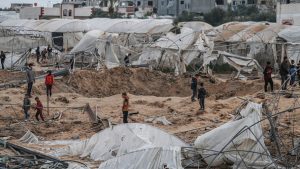Imagine that you are in your home, in your neighborhood, and suddenly soldiers, armed to the teeth and supported internationally by the UN, occupy your country and from one day to the next you have to go into exile or become an outcast in your own land. You have to ask for permission in order to travel and go to work. Everywhere you’re enclosed within walls. And if you protest, you are considered a terrorist.
It seems like a scary movie, but it is far from that, because it is what Palestinians have experienced — and continue to experience — since the creation of Israel, the state that changed the map of the Middle East.
The Zionist movement was one of the main proponents of its construction. This political movement emerged at the end of the 19th century within a small sector of the Jewish bourgeoisie that was very much influenced by European ideas such as nationalism and colonization.
To Zionists, the only way to combat anti-Semitism was to build a state of their own that would bring together all the Jewish people scattered around the world, and the place chosen according to the Bible — a work with limited scientific rigor — was Palestine.
Other options were also considered, such as Argentina and Uganda, which were very fertile and sparsely populated, but it was impossible to justify their occupation.
Another strong proponent of creating the state of Israel was the UN and, through it, the winning powers of the Second World War. A rather cynical move considering that both the United States and England — during the war — refused to give asylum to persecuted Jews.
The Causes
During Holocaust, more than six million Jewish people were murdered in concentration camps, in addition to communists, homosexuals, and other persecuted peoples such as Roma (something that is often forgotten). This situation, which exposed the brutalities of Nazism, was used as a central argument to justify the establishment of the state of Israel.
However, the real objectives of its creation in a geopolitically strategic area such as the Middle East were, on the one hand, that the world powers wanted to turn Israel into a “gendarme state” that would control other Arab countries closely and put a stop to the increasingly radical nationalist movements.
On the other hand, they wanted to “de-Arabize” Palestine. This meant that Israel had to consolidate itself as a kind of cultural barrier between the “Western world” and the “Arab world,” which was considered “wild” by Europeans.
The British, who had controlled much of the Middle East since World War I, had attempted to occupy Palestine in the 1930s by usurping land and helping to build settlements called kibbutzim. In practice, these were Zionist military camps that made communication among and between Palestinian cities impossible.
It is necessary to take into account that for centuries Arabs and Jews lived together peacefully in the region and even workers of both peoples had fought together against capitalist exploitation, showing that the conflict is not religious but political.
The state of Israel was created in 1948 as an expansionist policy of both Zionists and the world’s imperialist powers to control the Middle East. This plan, orchestrated by the UN, never received Palestinian endorsement. The plan was presented at the end of 1947 and gave 56% of the historic territory of Palestine to Israel when the Jewish population in the region was less than 30%.The Arab majority was forced to reduce its land by more than half.
In 1967, following the Six-Day War between Israel and its neighboring states of Egypt, Jordan, and Syria, Israel annexed 45,000 km of Jordan and Egypt. Some portions of these territories have been returned over the years through new wars and treaties.
But warfare was not the only form of expansion. Beginning in 1967, Israel began to occupy and colonize land in Palestinian territory with the formation of new settlements. At first there were a few dozen settlements. Today these settlements are real cities and there are 140 in total. They were built high up and in a circular shape to better be able to defend themselves and also to be able to attack locals.
They created tunnels, highways, and special roads that connected the Jewish settlements to each other and which only Jewish settlers could use. Today there are more than half a million settlers outside the territory Israel had initially taken over at its inception.
Of course, all of this would have been impossible without the active support and collaboration of Europe, the Soviet Union, until its dissolution, and above all its historical economic, political and military ally: the United States.
In fact every year, a percentage of the U.S. national budget is allocated to support Israel financially. Israel is one of the largest purchasers of weapons from the U.S. and the U.S. has a strong Zionist lobby among its leadership. In addition, the U.S. uses Israel’s territory as a military base to control oil in the Middle East and to target Iran and the rest of the Arab region.
Nakba (or Catastrophe)
The creation of this theocratic and racist state, with one of the most lethal armies in the world, provoked the massive and forced migration of Palestinians to two separate and isolated territories, the West Bank and the Gaza Strip, where they live in overcrowded conditions. Both areas are surrounded by walls that are between 7 and 8 meters high. This in turn has led to the forced resettlement of many thousands of refugees in Jordan and Syria.
While May 14 is known today as Israel’s independence day as on that day in 1948 Israel was declared a state, May 15 is known by Palestinians as Nakba (catastrophe in Arabic). On that same day, Palestinian resistance began.
The two symbols of Palestinian resistance are a key and a stone. Palestinian families pass on the keys to their old houses, occupied by the Israeli army, from generation to generation. They are convinced that through their struggle they will be able to return home. The stones represent popular rebellions known as Intifadas.
The first Intifada, which took place in 1987, revitalized the Palestinian national movement against the occupation that had been deflated and demoralized. The second one, in 2000, took place in rejection of the Oslo Agreements signed by the Israeli minister Yitzhak Rabin, the Palestinian leader Yasser Arafat, and the American president Bill Clinton, in 1993. The Oslo Agreements committed to withdraw Israeli troops from Palestinian territory, something that was never fulfilled.
As a result of these agreements, young people lost confidence in the leadership of the resistance movements, such as Arafat’s PLO (Palestine Liberation Organization), because they made agreement with imperialist interests without providing a real solution for the Palestinian people.
The Palestinian resistance was later joined by an important international movement repudiating Israel’s actions, with well-known actors and artists such as Javier Bardem, Pedro Almodovar, Selena Gomez, Mark Ruffalo, Madonna, and Roger Waters campaigning to bring down the wall. There are also movements of anti-Zionist Jews, in Israel and the U.S., who are militant and actively denounce the occupation. Many in Israel were even imprisoned and accused of being “anti-Jewish.”
Today the pandemic has undoubtedly worsened the already critical situation of the Palestinians. All health supplies are controlled by the State of Israel. In Gaza, hospitals lack supplies, drinking water is contaminated, and people live in overcrowded conditions. As Ahmad Al Jaradat, from Hebron, denounces in an interview: “There are about 6 thousand prisoners in different Israeli jails and these prisoners are living in crowded rooms. So far the Israeli occupation has not dealt seriously with the problem of the virus.”
Because of this situation, because of the mass exiles and because of the terribly false image created by the Israelis that all Palestinians are terrorists, the recovery of these lands, historic Palestine, is a legitimate claim felt strongly by all Palestinians and the rest of the Arab peoples.
Originally published in Izquierda Diario











